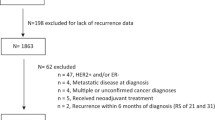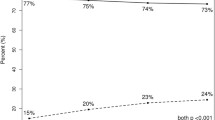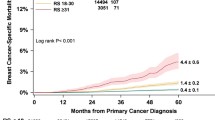Abstract
Purpose
The Oncotype DX® Breast Recurrence Score™ (RS) assay is validated to predict breast cancer (BC) recurrence and adjuvant chemotherapy benefit in select patients with lymph node-positive (LN+), hormone receptor-positive (HR+), HER2-negative BC. We assessed 5-year BC-specific survival (BCSS) in LN+ patients with RS results in SEER databases.
Methods
In this population-based study, BC cases in SEER registries (diagnosed 2004–2013) were linked to RS results from assays performed by Genomic Health (2004–2014). The primary analysis included only patients (diagnosed 2004–2012) with LN+ (including micrometastases), HR+ (per SEER), and HER2-negative (per RT-PCR) primary invasive BC (N = 6768). BCSS, assessed by RS category and number of positive lymph nodes, was calculated using the actuarial method.
Results
The proportion of patients with RS results and LN+ disease (N = 8782) increased over time between 2004 and 2013, and decreased with increasing lymph node involvement from micrometastases to ≥4 lymph nodes. Five-year BCSS outcomes for those with RS < 18 ranged from 98.9% (95% CI 97.4–99.6) for those with micrometastases to 92.8% (95% CI 73.4–98.2) for those with ≥4 lymph nodes. Similar patterns were found for patients with RS 18–30 and RS ≥ 31. RS group was strongly predictive of BCSS among patients with micrometastases or up to three positive lymph nodes (p < 0.001).
Conclusions
Overall, 5-year BCSS is excellent for patients with RS < 18 and micrometastases, one or two positive lymph nodes, and worsens with additionally involved lymph nodes. Further analyses should account for treatment variables, and longitudinal updates will be important to better characterize utilization of Oncotype DX testing and long-term survival outcomes.



Similar content being viewed by others
Abbreviations
- 1LN:
-
One positive lymph node
- 1–3LN:
-
One to three positive lymph nodes
- 2LN:
-
Two positive lymph nodes
- 2–3LN:
-
Two to three positive lymph nodes
- 3LN:
-
Three positive lymph nodes
- ≥4LN:
-
Four or more positive lymph nodes
- ANOVA:
-
Analysis of variance
- BC:
-
Breast cancer
- BCSS:
-
Breast cancer-specific survival
- CI:
-
Confidence interval
- ER:
-
Estrogen receptor
- HER2:
-
Human epidermal growth factor receptor 2
- HR+:
-
Hormone receptor-positive (ER-positive, PR-positive, or both)
- LN+:
-
Lymph node-positive
- N1mi:
-
Micrometastases
- PR:
-
Progesterone receptor
- RS:
-
Recurrence Score®
- RT-PCR:
-
Reverse transcription-polymerase chain reaction
- RxPONDER:
-
Treatment (Rx) for positive node, endocrine-responsive breast cancer
- SD:
-
Standard deviation
- SEER:
-
Surveillance, epidemiology, and end results
- SES:
-
Socioeconomic status
References
Paik S, Shak S, Tang G, Kim C, Baker J, Cronin M, Baehner FL, Walker MG, Watson D, Park T, Hiller W, Fisher ER, Wickerham DL, Bryant J, Wolmark N (2004) A multigene assay to predict recurrence of tamoxifen-treated, node-negative breast cancer. N Engl J Med 351(27):2817–2826. doi:10.1056/NEJMoa041588
Paik S, Tang G, Shak S, Kim C, Baker J, Kim W, Cronin M, Baehner FL, Watson D, Bryant J, Costantino JP, Geyer CE Jr, Wickerham DL, Wolmark N (2006) Gene expression and benefit of chemotherapy in women with node-negative, estrogen receptor-positive breast cancer. J Clin Oncol 24(23):3726–3734. doi:10.1200/JCO.2005.04.7985
Albanell J, Gonzalez A, Ruiz-Borrego M, Alba E, Garcia-Saenz JA, Corominas JM, Burgues O, Furio V, Rojo A, Palacios J, Bermejo B, Martinez-Garcia M, Limon ML, Munoz AS, Martin M, Tusquets I, Rojo F, Colomer R, Faull I, Lluch A (2012) Prospective transGEICAM study of the impact of the 21-gene Recurrence Score assay and traditional clinicopathological factors on adjuvant clinical decision making in women with estrogen receptor-positive (ER+) node-negative breast cancer. Ann Oncol 23(3):625–631. doi:10.1093/annonc/mdr278
Asad J, Jacobson AF, Estabrook A, Smith SR, Boolbol SK, Feldman SM, Osborne MP, Boachie-Adjei K, Twardzik W, Tartter PI (2008) Does Oncotype DX Recurrence Score affect the management of patients with early-stage breast cancer? Am J Surg 196(4):527–529. doi:10.1016/j.amjsurg.2008.06.021
Henry LR, Stojadinovic A, Swain SM, Prindiville S, Cordes R, Soballe PW (2009) The influence of a gene expression profile on breast cancer decisions. J Surg Oncol 99(6):319–323. doi:10.1002/jso.21244
Joh JE, Esposito NN, Kiluk JV, Laronga C, Lee MC, Loftus L, Soliman H, Boughey JC, Reynolds C, Lawton TJ, Acs PI, Gordan L, Acs G (2011) The effect of Oncotype DX Recurrence Score on treatment recommendations for patients with estrogen receptor-positive early stage breast cancer and correlation with estimation of recurrence risk by breast cancer specialists. Oncologist 16(11):1520–1526. doi:10.1634/theoncologist.2011-0045
Dinan MA, Mi X, Reed SD, Lyman GH, Curtis LH (2015) Association between use of the 21-gene Recurrence Score assay and receipt of chemotherapy among medicare beneficiaries with early-stage breast cancer, 2005–2009. JAMA Oncol 1(8):1098–1109. doi:10.1001/jamaoncol.2015.2722
Reed SD, Dinan MA, Schulman KA, Lyman GH (2013) Cost-effectiveness of the 21-gene recurrence score assay in the context of multifactorial decision making to guide chemotherapy for early-stage breast cancer. Genet Med 15(3):203–211. doi:10.1038/gim.2012.119
Trosman JR, Van Bebber SL, Phillips KA (2010) Coverage policy development for personalized medicine: private payer perspectives on developing policy for the 21-gene assay. J Oncol Pract 6(5):238–242. doi:10.1200/JOP.000075
Albain KS, Barlow WE, Shak S, Hortobagyi GN, Livingston RB, Yeh IT, Ravdin P, Bugarini R, Baehner FL, Davidson NE, Sledge GW, Winer EP, Hudis C, Ingle JN, Perez EA, Pritchard KI, Shepherd L, Gralow JR, Yoshizawa C, Allred DC, Osborne CK, Hayes DF, Breast Cancer Intergroup of North America (2010) Prognostic and predictive value of the 21-gene recurrence score assay in postmenopausal women with node-positive, oestrogen-receptor-positive breast cancer on chemotherapy: a retrospective analysis of a randomised trial. Lancet Oncol 11(1):55–65. doi:10.1016/S1470-2045(09)70314-6
Dowsett M, Cuzick J, Wale C, Forbes J, Mallon EA, Salter J, Quinn E, Dunbier A, Baum M, Buzdar A, Howell A, Bugarini R, Baehner FL, Shak S (2010) Prediction of risk of distant recurrence using the 21-gene recurrence score in node-negative and node-positive postmenopausal patients with breast cancer treated with anastrozole or tamoxifen: a TransATAC study. J Clin Oncol 28(11):1829–1834. doi:10.1200/JCO.2009.24.4798
National Comprehensive Cancer Network (2015) NCCN Clinical practice guidelines in oncology: breast cancer. Invasive breast cancer. https://www.nccn.org/
Wong WB, Ramsey SD, Barlow WE, Garrison LP Jr, Veenstra DL (2012) The value of comparative effectiveness research: projected return on investment of the RxPONDER trial (SWOG S1007). Contemp Clin Trials 33(6):1117–1123. doi:10.1016/j.cct.2012.08.006
Grenader T, Yerushalmi R, Tokar M, Fried G, Kaufman B, Peretz T, Geffen DB (2014) The 21-gene recurrence score assay (Oncotype DX) in estrogen receptor-positive male breast cancer: experience in an Israeli cohort. Oncology 87(1):1–6. doi:10.1159/000360793
National Center for Health Statistics (2016) http://www.cdc.gov/nchs/index.htm. Accessed 6 July 2016
Howlader N, Ries LA, Mariotto AB, Reichman ME, Ruhl J, Cronin KA (2010) Improved estimates of cancer-specific survival rates from population-based data. J Natl Cancer Inst 102(20):1584–1598. doi:10.1093/jnci/djq366
Noone AM, Lund JL, Mariotto A, Cronin K, McNeel T, Deapen D, Warren JL (2016) Comparison of SEER treatment data with medicare claims. Med Care 54(9):e55–e64. doi:10.1097/MLR.0000000000000073
Petkov V, Miller DP, Howlader N, Gliner N, Howe W, Schussler N, Cronin K, Baehner FL, Cress R, Deapen D, Glaser SL, Hernandez BY, Lynch CF, Mueller L, Schwartz AG, Schwartz SM, Stroup A, Sweeney C, Tucker TC, Ward KC, Wiggins C, Wu X, Penberthy L, Shak S (2016) Breast-cancer-specific mortality in patients treated based on the 21-gene assay: a SEER population-based study. NPJ Breast Cancer 2:16017. doi:10.1038/npjbcancer.2016.17
Roberts MC, Weinberger M, Dusetzina SB, Dinan MA, Reeder-Hayes KE, Carey LA, Troester MA, Wheeler SB (2016) Racial variation in the uptake of oncotype DX testing for early-stage breast cancer. J Clin Oncol 34(2):130–138. doi:10.1200/JCO.2015.63.2489
Acknowledgements
We acknowledge Anna Lau for medical writing and editorial assistance. The ideas and opinions expressed herein are those of the author(s) and endorsement by any State, Department of Public Health, the National Cancer Institute, the Centers for Disease Control and Prevention, or their Contractors and Subcontractors is not intended nor should be inferred. The Surveillance, Epidemiology and End Results (SEER) Program is funded by the National Cancer Institute (NCI). Genomic Health performed the work to electronically submit the Recurrence Score results, but provided no funding for this study. We acknowledge the SEER registries for collecting the SEER data.
Author information
Authors and Affiliations
Corresponding author
Ethics declarations
Conflict of interest
Dr. Roberts and Dr. Petkov declare no conflicts of interest. Mr. Dave Miller and Dr. Stephen Shak are employed by and have stock ownership in Genomic Health Inc.
Electronic supplementary material
Below is the link to the electronic supplementary material.
Rights and permissions
About this article
Cite this article
Roberts, M.C., Miller, D.P., Shak, S. et al. Breast cancer-specific survival in patients with lymph node-positive hormone receptor-positive invasive breast cancer and Oncotype DX Recurrence Score results in the SEER database. Breast Cancer Res Treat 163, 303–310 (2017). https://doi.org/10.1007/s10549-017-4162-3
Received:
Accepted:
Published:
Issue Date:
DOI: https://doi.org/10.1007/s10549-017-4162-3




